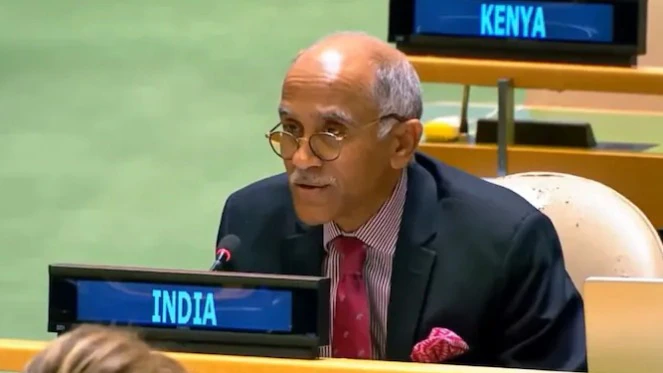United Nations (Rajeev Sharma) — India delivered a scathing rebuttal to Pakistan at the United Nations Security Council, accusing its neighbour of weaponizing international platforms to spread disinformation while ignoring its own dark history of human rights violations, including a brutal campaign of violence during the 1971 Bangladesh Liberation War.
Speaking during an open debate on the theme “Women, Peace and Security,” India’s Permanent Representative to the UN, Ambassador Parvathaneni Harish, took direct aim at Pakistan’s record, citing its military’s role in Operation Searchlight — a 1971 crackdown in then-East Pakistan that involved mass killings and the use of rape as a tool of war.
“This is a country whose army turned on its own people — bombing civilians and carrying out genocidal violence, including the rape of hundreds of thousands of women,” Harish stated firmly during his address.
The Indian envoy’s remarks came in response to Pakistan’s representative raising the issue of Jammu and Kashmir, alleging the exclusion of Kashmiri women from the global Women, Peace and Security agenda.
India, in turn, called Pakistan’s intervention “predictable and hollow,” dismissing it as a routine attempt to hijack multilateral discussions for political point-scoring.
“We are, year after year, subjected to the same tired narrative, filled with distortions and falsehoods. Pakistan seeks to distract the world from its own record by projecting blame outward,” Harish said.
1971 Conflict Resurfaces in UN Discourse
India’s strong words rekindled international focus on one of the subcontinent’s most traumatic historical episodes — the 1971 civil war that led to the creation of Bangladesh. The Pakistani military’s violent suppression of Bengali demands for autonomy resulted in the deaths of hundreds of thousands, with mass sexual violence committed against an estimated 400,000 women, according to multiple human rights reports and historians.
Harish underscored that no amount of diplomatic deflection could obscure the facts of that period, which, he said, represent one of the most egregious state-led atrocities in modern history.
India Highlights Peacekeeping Credentials
Turning to India’s own role in global peace and security, Ambassador Harish detailed the country’s long-standing commitment to women’s participation in UN peacekeeping missions, calling it a model for inclusivity and effectiveness.
He noted that as early as the 1960s, India had deployed female medical personnel to UN operations, well before women’s roles in peacekeeping became a global priority.
“India’s peacekeeping legacy is not only defined by scale but also by leadership — particularly in ensuring women are recognized as central to peacebuilding,” he said.
He also highlighted the International Conference on Women Peacekeepers from the Global South, hosted by India in February 2025, which brought together women from 35 countries to strategize on expanding the role and safety of female peacekeepers in active missions.
A Call for Collaboration, Not Propaganda
Harish concluded by reiterating India’s support for global peace initiatives and gender-sensitive conflict resolution, offering to share its expertise with countries across the Global South.
“Our commitment to the Women, Peace and Security agenda is both principled and practical. While some choose to use these forums for political theatre, we remain focused on collaborative, actionable outcomes,” he said.
India’s forceful response at the Security Council served as a reminder of the continuing geopolitical tension between New Delhi and Islamabad — but also underscored India’s intent to shift the conversation toward constructive engagement and global cooperation on peace and security.

